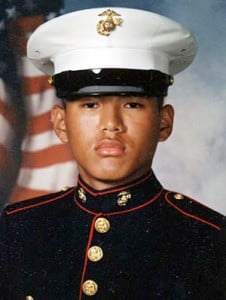
US Marine Tenzin Choeku Dengkhim, killed Saturday, April 2 2005 in Iraq.
As far as his family knows, he didn’t. On Saturday 2 April, Lance Cpl. Dengkhim was killed during a firefight in the Al Anbar province in Iraq, where he served as part of the 2nd Light Armored Reconnaissance Battalion in the 2nd Marine Division based at Camp Lejeune, North Carolina. He was the first Tibetan-American to die in the war in Iraq.
Tenzin was buried with full military honours at Arlington cemetery, Virginia, resting place of JF Kennedy and numerous American military heroes, on Monday (11 April). His grave is in the shade of cherry-blossoms among a sea of white marble headstones marking those of other young soldiers who died in “Operation Iraq Freedom”.
As Washington’s Tibetan community slowly followed the hearse to the graveside, Tibetan monks chanted prayers at his coffin, draped with the Stars and Stripes. When the monks fell silent, seven soldiers fired a 21-gun salute, and a solitary bugler played the anthem ‘Taps’. The American flag was taken from the coffin and in time-honoured military tradition, a Marine officer knelt at Tenzin’s mother’s feet and presented her with the flag, “on behalf of a grateful nation”.
Tenzin’s commitment to serving in Iraq was strengthened by his identity as a Tibetan and the knowledge that his mother, Rigzin, a single parent, had fled from her homeland after the Chinese invaded Tibet. He told friends that he wanted to help Iraq in its struggle towards democracy, and that he hoped that gaining military training and an education would enable him one day to help the cause of Tibetan freedom.
In an emotional address to the Tibetan community who had gathered by Tenzin’s graveside, his mother Rigzin said: “The US was not his native country, but Tenzin adopted it as his own. He has sacrificed his life for this country. My prayer is that this precious life that is lost will contribute to eliminating all the obstacles that his battalion, and all the US military, are facing in Iraq.”
Rigzin had escaped from Tibet as a child to live in exile in India, where Tenzin was born in the Tibetan community of Dharamsala, Himachal Pradesh, base of the Dalai Lama and the Tibetan government in exile. Rigzin, a single mother, was among the first of a group of Tibetan refugees who moved to Utah in 1992, made possible by an Act of Congress that provided 1,000 Tibetans with a chance to immigrate to the US. Rigzin later found a job at Radio Free Asia in Washington DC, where she works now. She and her son were very close; before he left for the Marines, Tenzin would have dinner ready for his mother when she came home from work each night. When he left for military training in North Caroline, he asked his friend Thinley to make sure to help his mother with her shopping when he was away.
Tenzin is remembered by his friends as a quiet, thoughtful young man, devoted to his family, who always gave money to homeless people he met on the streets, and helped out his neighbours. One friend, Thinley, who knew him from a school for Tibetan exiles in India, said that as a child Tenzin was quiet and shy, but had become a popular, sporty young man who loved basketball. Every year, he and three other Tibetan friends, all called Tenzin, went to New York to participate in an East Coast Tibetan basketball contest. All four Tenzins, like many young Tibetans living in the West away from their country, were inspired by the memory of Tibetan exile Thubten Ngodrup, who set fire to himself in April 1998 during a hunger strike by young Tibetans in India, in an attempt to alert the international community to the plight of Tibetans suffering under Chinese rule.
While he was at school, Dengkhim collected signatures for an International Campaign for Tibet initiative to support the Tibetan Policy Act, a major piece of legislation protecting Tibetan rights, which was later signed into law by President Bush in 2002. His mother Rigzin says: “He was very proud and happy when the law was passed.” At his funeral, Rigzin told Tibetan friends that the number-plate of Tenzin’s first car was “Rangzen”, (“freedom” in Tibetan).
Tenzin’s prayers that he would not have to kill any Iraqi people indicate that he was well aware of the potential conflict between the Tibetan leader the Dalai Lama’s doctrine of non-violence and his role as a Marine. But Tibetans believe that in all actions, motivation is crucial, and those who were close to Tenzin had no doubt about his integrity and unwavering faith.
Tibetan Buddhists believe that for 49 days after death, the soul of the deceased is in an interim state, and that it visits home during this time. Tibetan monks will stay at Tenzin’s home to chant prayers for a fortunate rebirth at his home for this 49-day period at a shrine adorned by butter-lamps and incense, with a photograph of Tenzin in his Marines uniform and the Tibetan and US national flags side by side.
A family friend, Pema Chagzoetsang said: “Deep down, Tenzin held the great spirit of Tibet. I think his mission is fulfilled and as a Tibetan, he contributed to the American cause.” His friend Tenzin Seldon writes in a memorial to Tenzin: “As our Buddhist faith teaches us, our karma dictates where we end up. For dearest Tenzin Choeku, we pray that you have a good rebirth. We miss you more than words can express.”

